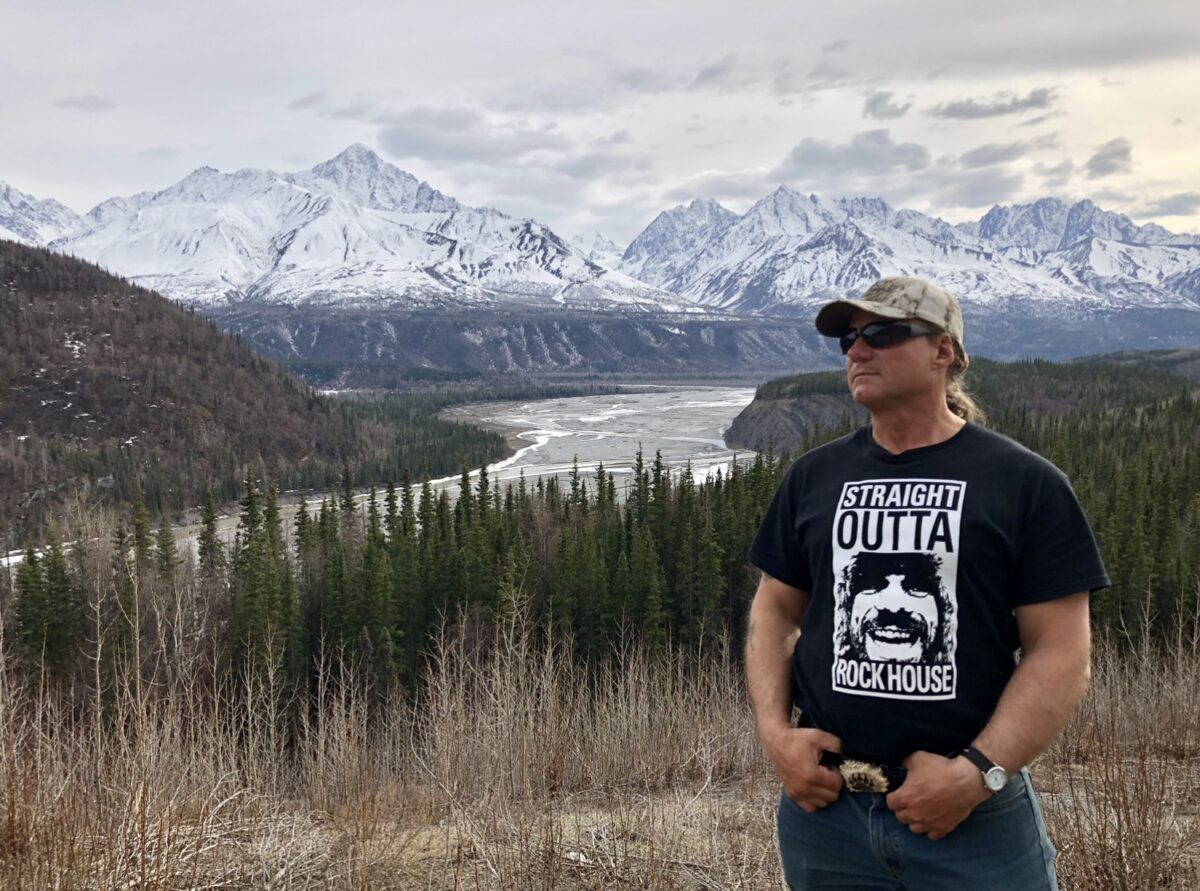Roland Welker is as tough as they come. He’s a bushman, fur trapper, big game guide, logger, and survivalist who spends months at a time alone, deep in the wilderness of the western Bush region of Alaska. His tough exterior is evidenced in the dirt embedded deep in his fingertips, his raspy yet animated voice, and his calm and unflappable demeanor as he chops wood, butchers a fresh kill, or builds a shelter. He’s tough, yes, but he’s also incredibly reflective about the outdoors, and his call to live like the “old-timers” in the wild.
He calls his lifestyle “getting woodsy” and says it’s a mentality—like a game of chess—where you have to think about every move you make. You have to be able to look around you and utilize what’s at hand. It means living like an old-timer, dependent on skills, physical fitness, and the land.
A Lifetime of Experience
Welker’s passion for the outdoors was ignited during his childhood growing up in the Appalachian mountains of central Pennsylvania. Wanting to immerse himself even more into the wilderness, during his 20s, Welker set his sights on Alaska. Now 49, his outdoor experiences for the past 28 years have led him to become an expert at wilderness survival. In fall 2019, he participated in filming for Season 7 of the History Channel’s survivor show, ALONE, and won.
For the first time in the series, rather than determining the winner by which contestant lasted the longest before “tapping out,” Season 7 offered the largest prize yet: $1 million to any contestant who could last 100 days in the wilderness of the Canadian Arctic.
Welker was a natural, and his calm determination alongside a lifetime of survival experience led him to win the prize. He achieved a lot of “firsts” for the show, including killing an 800-pound musk ox with one arrow and a belt knife, building a shelter he termed “Rock House,” and building a meat cache that rivaled any contestant’s shelter—assuring that his meat would be safe from predators. His mindset had as much to do with his success as his survival skills; Welker said he went in prepared to stay the whole winter—well over the required 100 days—which led him to chop wood for hours each day and allowed him to amass enough wood to get through the negative 30 to 40-degree temperatures.
The Trek to Alaska
Raised in Shiloh, Penn., by the age of 8, Welker was setting traps that he would check by flashlight before going to school. He was camping solo by age 11 and had a backpack ready by the door so he could head out each weekend. Sometimes it was with family or friends, but if no one was available, he was just as happy to go alone.
“I grew up there in the 70s,” Welker said. “It was still kind of a really neat backwater place in the 70s—a lot of farms still going, the dairy industry was still there. There’s always been logging and still is to this day; coal businesses were booming in the 70s before it went extinct. It was just a really neat time to be a boy in central Pennsylvania—Shiloh, in particular.”

A voracious reader, Welker said his father taught him a love of reading by introducing him to American novelist Louis L’Amour and Western books. “I remember him buying ‘The Big Sky,’ a 1947 Western novel by A. B. Guthrie Jr.” The book paints a portrait of life for mountain men between 1830 to 1843. Welker said he has read the book 30 or 40 times. “It’s my favorite. People say I kind of became a character from that book. It’s almost scary.”
At 24, Welker struck out for Alaska, eventually making his way to Red Devil by accident. Red Devil, Alaska, had a population of 23 as of the 2010 national census. Welker fished and hunted along the Kuskokwim River.
“This is mountain country. It was winter and ice was running when I arrived, and this was my first Alaska winter. I was getting into the thick quick,” he said. Welker soon realized that “this is the place I had been looking for forever. It was still frontier-y and wild west, so to speak.”
Welker says he was a bit of a reckless teenager, and credits the wilderness for taming what he calls “shift energy”—that young aggressiveness of his teen years.
“I found this place [Red Devil], and I took a lot of that energy and absorbed it into major expeditions that I would fund myself. I’d pick a piece of country and start calling in supplies so I could trap all winter.”
Welker said his lifestyle was affected by the nation’s founding fathers and historical figures he learned about through reading.
“I absorbed myself in every book on history that I could lay my hands on starting in the sixth grade,” he said. He particularly enjoyed the works of Allan W. Eckert, a 20th-century author who wrote historical novels about Native American tribes.
Welker wanted to be like the novel protagonists. “Somewhat unknowingly, I started forming myself under the likeliness of the frontiersman in the mountain at a very young age. I am not just a hunter, I’m a sportsman. I’m absorbed in the old traditions of frontiersmen, and that’s what carried me through ALONE,” he said.
Jill Dutton is a travel writer who seeks out locally celebrated foods, outdoor activities, and liquor trends. She’s passionate about telling the stories of those she meets on her travels, offering a glimpse at the culture of place. Follow Jill’s travels at www.USAbyRail.blog.




